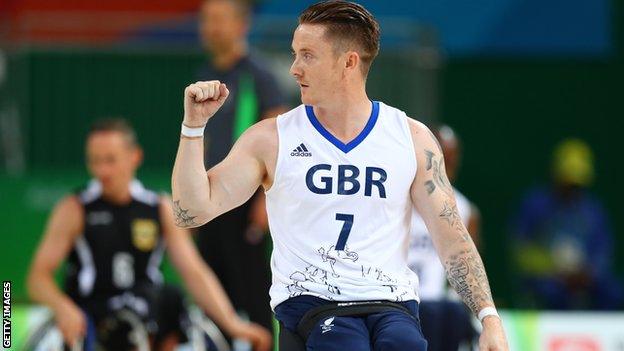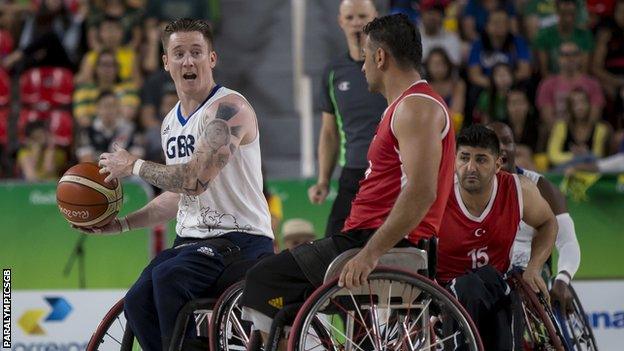Tokyo Paralympics: Terry Bywater looks to a 'different' sixth Games
- Published

Bywater's experience will be key for the GB men in Tokyo
Paralympic Games on the BBC |
|---|
Venue: Tokyo, Japan Dates: 24 August-5 September Time in Tokyo: BST +8 |
Coverage: Follow on Radio 5 Live and on the BBC Sport website |
Over his more than 20 years in elite sport, Great Britain wheelchair basketball player Terry Bywater thought he had experienced most things - but the global pandemic was his biggest challenge to date.
A Paralympic debutant aged 17 at Sydney 2000, Tokyo will be Bywater's sixth Games and having gone through a tough lockdown in Spain, where he plays professionally with Madrid side CD Ilunion, he has had to draw on all his strength and experience to be involved with GB once again.
"The last 18 months have really tough for everyone. As a professional athlete, my life had been so regimented. When that was taken away, I didn't know what to do," he tells BBC Sport.
"At the start, we could only leave the house to buy food and there were police on the streets asking what you were doing. It was the weirdest feeling ever.
"I wondered if I would get to another Paralympics and it was the most difficult time in my professional career.
"When we did get back, I was coming home from training with blisters and bleeding hands and aches and pains because my body wasn't used to it. We had to relearn the basics like taking hits and falling out of the chair."
Bywater was born without a tibia and a fibula in his leg, which was amputated when he was two. The football-mad youngster from Middlesbrough saw his life change when he started playing wheelchair basketball as a 13-year-old.
Now 38, he has been a mainstay of the GB team since, winning three Paralympic bronzes, including in Rio five years ago, a host of European titles, including in 2019, and a first world title in 2018.
They go to Tokyo hoping to hold all three major titles at once but face a difficult pool with defending champions and World Championship runners-up USA, plus Australia and Iran, who were third and fourth at the Worlds, as well as Germany and Algeria. The top four teams qualify for the quarter-final crossover matches.
"To win the Worlds was a dream come true but we know we have a big target on our backs," says Bywater.
"With the top four teams from the Worlds playing each other, getting out of the group will be a challenge and it really matters where you finish in the pool because the crossovers will be tough.
"There is no room for complacency because there are eight or nine teams who can win gold. Every game is like a final.
"I'm not the player I was 10 years ago where I played every minute of every game. I'm going to be coming in off the bench but I'm someone who always shows up in the big games.
"We can finish on the podium, which would be fantastic, but a Paralympic gold would make me the proudest man on earth."
Preparations for all of the athletes at the Tokyo Games have been challenging but as well as following Covid-19 protocols, GB have also been affected by classification issues with key player George Bates ruled out after being deemed ineligible for Paralympic competition.
Bywater knows he and his team-mates are lucky to have the support of the GB Wheelchair Basketball Association and ParalympicsGB for their chance to compete on the big stage.
However, it will be a different experience this time with family and friends, including Bywater's wife Jodie and 11-year-old son Benjamin, following from home.

Bywater helped GB beat Turkey to win bronze in Rio in 2016 after bronzes in 2004 and 2008
"Around half of the team will be going to their first Games so I've been trying to share my knowledge with them, although there's a lot which is new for me this time," he says.
"Not only has our head coach Haj (Bhania) been preparing us as a team to go to Tokyo and win a gold medal, we are also trying to prepare for what happens if we as players are affected by Covid.
"I think the team who prepares the best and deals the best with any setbacks will be the one who will take gold."
On court the sport is changing too.
"Standards have risen so much since I started," he says. "Athletes have become faster and stronger and some of the shots they are making are incredible. The technology going into wheelchairs has improved a lot, but we need more sponsors for teams and individuals.
"The world shouldn't just look at us every four years - we need it on a weekly basis.
"We have a huge opportunity as Paralympians to inspire the world again. We saw the impact 2012 had - it was fantastic and we want to see more of that."

Breaking taboos in sport: Simone Biles, Naomi Osaka, Ben Stokes and their powerful message about mental wellbeing
For The Love of Hip Hop: Romesh Ranganathan dives into the genre, not always successfully
